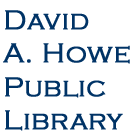Accessibility
As part of the library’s initiative to provide free and equal access to computer technologies and the Internet, public computers are made available to library users for the purpose of educational and recreational research. Library users agree to use the computers and the Internet in a responsible, efficient, ethical and legal manner. Any use outside these established policies may result in loss of privileges. Unlawful activities will be dealt with in accordance with local, state and federal laws.
Governing Rules
To achieve a place of safe and friendly research, the library has established the following rules regarding the use of public computers.
Library users may not:
- Display web pages that contain images, sounds, or messages that will negatively affect those who find them objectionable, offensive, or disruptive.
- Damage computer equipment or software; degradation of system performance. (Library users are fiscally responsible for damage to library computers.)
- Engage in activity that is harassing, defamatory, or violates the physical safety or mental well-being of other library users and library staff.
- Use any library computers for illegal or criminal purposes, including but not limited to: coercion, fraud, theft, copyright infringement or violation of software agreements.
Filtering
As required by the Children’s Internet Protection Act (CIPA), in order to remain eligible for certain federal funding, the library has implemented Internet filtering on all of its public computers. This filtering system does not block all “offensive” content and may block content that has educational value. The library cannot guarantee the performance of Internet filtering. Under CIPA, the library will disable Internet filters for any library user 18 years of age or older to access websites that have been blocked. Access will only be granted for bona fide research and lawful purposes.
Access to Children
To provide a safe environment for our community’s children, the library requires that any child age 8 and under must be attended by a parent or legal guardian when using the computers. Parents and legal guardians must also be responsible for children 8 years of age and older by taking an active part in their child’s learning experience. The library expects that parents and caretakers of children will guide them in their exploration of the Internet the same way that they provide guidance in the child’s choice of reading, listening or viewing materials.
All children and parents or legal guardians of children that have a juvenile library card must read and sign the library’s Children Internet Use Rules. All children with a juvenile library card must use the public computers in the Children’s Section of the library. The library makes information about Internet safety and child-appropriate sites readily available to all library users in Web Guides and provides links to children’s websites in the Children’s Section.
Signing-Up for Computer Use & Time Limits
- All adult library card holders in good standing may use public computers in the Reference Room and Stacks of the library.
- Users must sign in at the main desk, staff will log users onto the computer, and will assist users in getting started and using tutorials. Manuals and tutorial software may be signed out at the main desk.
- Patrons may not install, delete, or modify library hardware or software. Users are asked to leave all settings as they found them, close all windows and return to the desktop after use.
- Library users must pay by the page for all documents that they print. Users are advised to ask for assistance if they are new to printing or if they experience print delays.
- In the Adult Section, no more than 2 adult library card holders may use one computer at one time. Library users are asked to be considerate of others with regards to conversation and software program noise levels.
The Internet is an electronic dynamic source for information. The library cannot guarantee the accuracy or completeness of information on the Internet. Library users should carefully evaluate the information they find when using the resource. All transmissions (including e-mail) are not secure or private. The David A. Howe Public Library has no control over the information accessed through the Internet, and cannot be held responsible for its content.
Adopted May 10, 1999 and amended June 9, 2008 by the David A. Howe Public Library Board of Trustees.
